Published in Nacional number 607, 2007-07-03
EXCLUSIVE: How Vladimir Zagorec offered to turn state's evidence
Romano Bolkovic the Secret Mediator Between Stipe Mesic and Zagorec
SASA PERKOVIC, the presidential advisor who met with Zagorec, is ready to testify on his meeting with the fugitive before a Vienna court
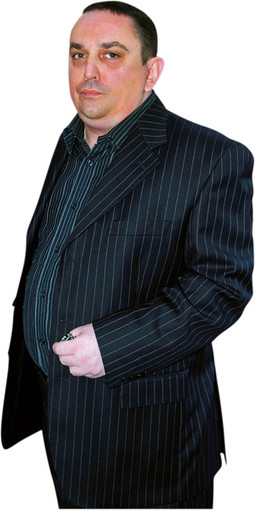 Romano BolkovicRomano Bolkovic, a reporter with Zagreb local TV station OTV, was the mediator that Vladimir Zagorec, on the run from Croatian justice officials because of suspicions that he stole gems worth at least 5 millions dollars, sent to President Stipe Mesic in early February with an offer to cut a deal. He offered to turn state's evidence for the State Attorney's office, Nacional has learned from circles close to the investigation into Zagorec's activities.
Romano BolkovicRomano Bolkovic, a reporter with Zagreb local TV station OTV, was the mediator that Vladimir Zagorec, on the run from Croatian justice officials because of suspicions that he stole gems worth at least 5 millions dollars, sent to President Stipe Mesic in early February with an offer to cut a deal. He offered to turn state's evidence for the State Attorney's office, Nacional has learned from circles close to the investigation into Zagorec's activities.
Romano Bolkovic and Zagorec's close associate Roman Binder, who passed him Zagorec's message, by all accounts first met in the Zagreb boutique of Zagorec's wife Klarisa, where Bolkovic, by his own assertion, often purchases special perfumes. Bolkovic informed President Stipe Mesic, and Mesic in turn the Chief State Attorney Mladen Bajic. Bajic then approved in writing that Mesic's go-between could establish contact with Zagorec. Mesic picked his national security advisor Sasa Perkovic for the job, who also serves as the deputy president of the Council for the Coordination of Security & Intelligence Agencies (KSOA). After several informal contacts with Binder, Perkovic met with Zagorec at the hotel Radisson SAS in Vienna on 25 May.
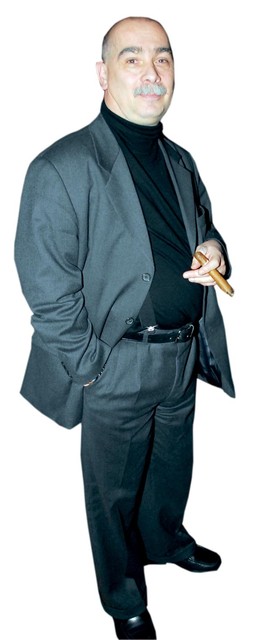 “Romano Bolkovic informed Mesic of his meeting with Zagorec's associate Binder and of his offer. That is how the President's contacts with the general started, which in the end did not turn out to be such a good move”During that meeting Zagorec revealed to Perkovic the existence of some secret bank accounts abroad containing misappropriated funds earmarked for the defence of Croatia and gave him the names of some persons who controlled those accounts, as well as some documents that Zagorec believes prove his claims. Just how good the information Zagorec has provided for the State Attorney's office is being checked out. In return he has asked that by 16 June the State Attorney's office withdraw the charges against him. As Bajic did not agree, Zagorec on 27 June at the District Court (Landesgericht) in Vienna decided to cut off the talks and speak out about the communication. He depicted the event, however, in a way that would ease his position, claiming that the communication was initiated by the Office of President Stipe Mesic, who promised to take care of having the charges dropped if he decided to speak out about the misappropriation of funds for the defence of Croatia. Zagorec did so in order to try to convince the Austrian court that the proceedings against him are politically motivated and that he would therefore not get a fair trial in Croatia.
“Romano Bolkovic informed Mesic of his meeting with Zagorec's associate Binder and of his offer. That is how the President's contacts with the general started, which in the end did not turn out to be such a good move”During that meeting Zagorec revealed to Perkovic the existence of some secret bank accounts abroad containing misappropriated funds earmarked for the defence of Croatia and gave him the names of some persons who controlled those accounts, as well as some documents that Zagorec believes prove his claims. Just how good the information Zagorec has provided for the State Attorney's office is being checked out. In return he has asked that by 16 June the State Attorney's office withdraw the charges against him. As Bajic did not agree, Zagorec on 27 June at the District Court (Landesgericht) in Vienna decided to cut off the talks and speak out about the communication. He depicted the event, however, in a way that would ease his position, claiming that the communication was initiated by the Office of President Stipe Mesic, who promised to take care of having the charges dropped if he decided to speak out about the misappropriation of funds for the defence of Croatia. Zagorec did so in order to try to convince the Austrian court that the proceedings against him are politically motivated and that he would therefore not get a fair trial in Croatia.
After that Sasa Perkovic expressed his willingness to testify before the District Court in Vienna, where a ruling should be made on 25 July concerning the extradition of Zagorec to Croatia. Perkovic is prepared to show the court the written approval of the State Attorney's office to meet with Zagorec on 25 May to attempt negotiations with him and try to catch the bigger players involved in the misappropriation. The aim is to convince the District Court that communication was set up with Zagorec not on the initiative of political circles, but that the President's Office did so after it secured the approval of the State Attorney's office and after Zagorec's initiatives.
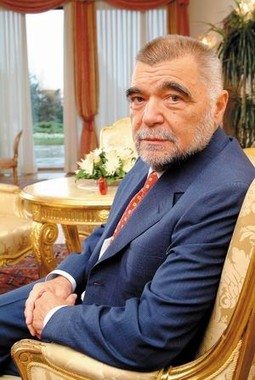 'PRESIDENT STIPE MESIC has been grossly manipulated in Zagorec's game' This is the temporary epilogue of the secret communication between Vladimir Zagorec and the State Attorney's office concerning his possible testimony for the state. The State Attorney's office did not want to give up its charges against Zagorec before the fact, because it felt that that would be jumping the gun in this phase of secret negotiations and the criminal proceedings against Zagorec. Allegedly the documents and information that Zagorec submitted are not in this form a sufficient guarantee that the others involved in misappropriating funds for the defence of Croatia would be adequately punished.
'PRESIDENT STIPE MESIC has been grossly manipulated in Zagorec's game' This is the temporary epilogue of the secret communication between Vladimir Zagorec and the State Attorney's office concerning his possible testimony for the state. The State Attorney's office did not want to give up its charges against Zagorec before the fact, because it felt that that would be jumping the gun in this phase of secret negotiations and the criminal proceedings against Zagorec. Allegedly the documents and information that Zagorec submitted are not in this form a sufficient guarantee that the others involved in misappropriating funds for the defence of Croatia would be adequately punished.
People close to the State Attorney's office have confirmed for Nacional that it is always ready to cut these kinds of deals, but never without guarantees that it would truly receive information based on which backing out of criminal proceedings against Zagorec would be less damaging than passing up the opportunity to successfully persecute more influential persons for similar crimes.
No one trusted the other side in these contacts. That is why Zagorec organised the secret recording of his meeting with Perkovic, and why the State Attorney's office two weeks later confiscated a stack of secret defence ministry and RH Alan Company documents from a friend of Zagorec's at the Macelj border crossing – documents Zagorec intended to barter with. The informal communication between Zagorec and the President's Office was also monitored by the Austrian police, which did not have a positive opinion of them. After Sasa Perkovic, advisor to President Mesic, spoke to Zagorec, and the conversation was recorded by the Austrian intelligence service, the Austrians sent an indirect communication to Mesic informing him of the event. The Austrian intelligence service at that point believed that Perkovic was a mole in Mesic's office and was communicating with the fugitive behind Mesic's back. This indicates that the Austrian police at that point had no idea that Mesic was aware of the contacts and that he was taking an intermediary role in the negotiations with Zagorec. The Austrian police in doing so also indirectly let Mesic know that they considered any contact by personnel from the President's Office with a fugitive suspected of misappropriating funds for the defence of Croatia to be very negative.
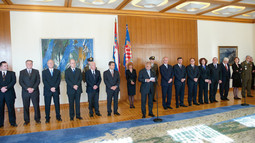 'PERKOVIC AT THE PRESIDENT'S OFFICE (fourth from the left) he is one of the best advisors, and enjoys Mesic's complete trust' The Austrian police are closely following every step made by Zagorec and they probably even then had reason to believe that Zagorec could try to use these kinds of contacts to show the Austrian judicial authorities that politics was behind his legal difficulties in Croatia. Mesic probably saw nothing amiss in it up to the middle of last week, when he realised that Zagorec was trying to grossly manipulate him. That is probably why he only laughed when he heard at the President's Office from the message bearer that the Austrians had learned of the contacts between Perkovic and Zagorec. Mesic then, smiling, told the message bearer that he was aware of these contacts. He told him that Zagorec had, through a go-between, sought contact with the President's Office, that the Chief State Attorney Mladen Bajic knew of this, and had approved the contacts, with the aim of possibly catching some "bigger fish" that, like Zagorec, misappropriated funds earmarked for the defence of Croatia. He then called Sasa Perkovic himself to the room and repeated the message from Austria and the entire story. He was then asked by the messenger recall all activities, but he clearly felt that everything would end up in the best possible order. It is now evident that he was wrong.
'PERKOVIC AT THE PRESIDENT'S OFFICE (fourth from the left) he is one of the best advisors, and enjoys Mesic's complete trust' The Austrian police are closely following every step made by Zagorec and they probably even then had reason to believe that Zagorec could try to use these kinds of contacts to show the Austrian judicial authorities that politics was behind his legal difficulties in Croatia. Mesic probably saw nothing amiss in it up to the middle of last week, when he realised that Zagorec was trying to grossly manipulate him. That is probably why he only laughed when he heard at the President's Office from the message bearer that the Austrians had learned of the contacts between Perkovic and Zagorec. Mesic then, smiling, told the message bearer that he was aware of these contacts. He told him that Zagorec had, through a go-between, sought contact with the President's Office, that the Chief State Attorney Mladen Bajic knew of this, and had approved the contacts, with the aim of possibly catching some "bigger fish" that, like Zagorec, misappropriated funds earmarked for the defence of Croatia. He then called Sasa Perkovic himself to the room and repeated the message from Austria and the entire story. He was then asked by the messenger recall all activities, but he clearly felt that everything would end up in the best possible order. It is now evident that he was wrong.
If it is true that that Zagorec first initiated the contact with the President's Office, it should not be ruled out that he did so only to grossly manipulate President Mesic. That these are not unfounded speculations is indicated by what happened on 27 June. A court hearing was held that day in Vienna that was to have seen a ruling on whether Austria would extradite Zagorec to Croatia. Zagorec's attorney Michael Dohr brought a DVD recording to the hearing of a discussion between Perkovic and Zagorec in Croatian and English. Zagorec, by all accounts, organised the secret recording of the meeting, as it is almost impossible that he got the recording from the Austrian police. A month and two days later he submitted that recording as, in his view, key proof that his problems with the Croatian State Attorney's office are politically motivated at that he would not receive a fair trial in Croatia.
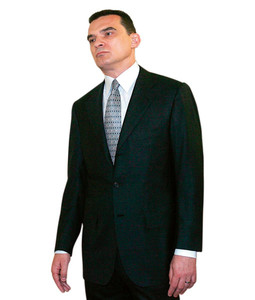 'ZAGOREC, by all accounts, organised the secret recording of his meeting with Perkovic' At the same hearing testimony was heard from Mario Keinz, a civil servant with the Austrian state police at the Department for the Protection of the Constitutional Order and Combating Terrorism, as a witness for the defence. Keinz said he had become acquainted with Zagorec in 2003 working on locating general Ante Gotovina, as rumours has surfaced then that Gotovina had hidden for a certain period of time in the house in which Zagorec lived in Austria. In the fall of 2006 Zagorec brought him documents on the intensive media campaign being led against him and his possible criminal persecution.
'ZAGOREC, by all accounts, organised the secret recording of his meeting with Perkovic' At the same hearing testimony was heard from Mario Keinz, a civil servant with the Austrian state police at the Department for the Protection of the Constitutional Order and Combating Terrorism, as a witness for the defence. Keinz said he had become acquainted with Zagorec in 2003 working on locating general Ante Gotovina, as rumours has surfaced then that Gotovina had hidden for a certain period of time in the house in which Zagorec lived in Austria. In the fall of 2006 Zagorec brought him documents on the intensive media campaign being led against him and his possible criminal persecution.
Zagorec's attorney Dohr then asked Keinz if he knew Sasa Perkovic. Keinz told him he knew who Perkovic was. Dohr then asked him if he knew of the meeting between Zagorec and Perkovic held 25 May. Keinz answered in the affirmative, saying that there was some kind of record to that effect. Dohr, by all accounts, called Keinz to the stand because he knew of his earlier contacts with Zagorec, but also because he was very much aware that the Austrian police were following his clients every step and because he knew that there were records of the telephone conversations and the meetings between Zagorec and Perkovic, of which Keinz could not lie in court.
The day later Zagorec by way of Zvonimir Hodak, his new attorney in Croatia, related his version of the circumstances of the contacts with Perkovic. Zagorec, by way of Hodak, told the Jutarnji list daily that Mesic had made the first contact with him, and that he promised him that by 16 June he would take care of having the warrant for his arrest withdrawn, and Zagorec was in return to have provided information on secret bank accounts, privatisation and commissions and back it all up with documentation. Zagorec claims that the first initiative for contact came from the President's Office in early February, that his friend met with Perkovic several times, that everything went via a go-between – a well-known TV reporter – that he met with Perkovic in Vienna on 25 May, and that everything fell through when he realised that the alleged deal with Mesic that he would personally see to it that the warrant for his arrest was recalled by 16 June would not go through.
If all this is true, Zagorec could after 27 June truly be in a better position that before, because he could legitimately claim that he was a victim of politics, and perhaps even that his criminal persecution was initiated by Stipe Mesic. These circumstances also shed an entirely new light on what took place on 8 June. On that day Krunoslav Trajkovic, a driver with the Molteh Company, until recently under the formal ownership of Zagorec’s close associate Roman Binder but in fact is owned by Zagorec, was stopped in a Mercedes cabriolet at the Macelj border crossing entering Slovenia. The Mercedes SL 300, bearing registration plates ZG 7009-F, was owned by Vladimir Zagorec. The car was manufactured in 1987, and was first registered in Croatia in 1993. Asked by the border police where he was going, Trajkovic answered that he was driving Zagorec’s car to Vienna and that he was also taking him some other things. Several folders where found in a large black bag containing over 500 documents all marked as military secrets. Trajkovic himself said that Roman Binder and Josip Ferek, also a close associate of Zagorec's, had instructed him to drive the car to Vienna to a designated address and hand it over with the bag to Zagorec's secretary. Zagorec's attorney Hodak subsequently said that these were documents that were to have served his client in writing his memoirs. The police seized the car and the documents. Most of the documents were originals, and a smaller amount photocopies. All of the documents were designated as military secrets, and only a smaller part was Zagorec's personal documentation from the period when he served at the defence ministry. After it was revealed that Zagorec and Mesic had been negotiating through intermediaries, it is now clear why and how Zagorec's car was stopped at the border.
As the State Attorney's office was aware of the negotiations, it is no wonder that it carefully monitored who was talking to whom and concerning what and when someone could take documents to Zagorec in Austria. After Zagorec's plan was uncovered by phone taps, they decided not to allow the material that Zagorec wished to barter with the Croatian authorities with to be taken out of the country. That is why they confiscated them in a justice department-espionage-police operation before they found their way into Zagorec's hands. This action on the part of the Croatian authorities, who in Zagorec's opinion did not abide by the deal, probably prompted the fugitive to square accounts with the President in this fashion. Zagorec hopes after the recent events to leave the impression before Austrian justice officials that he is being politically persecuted. If this works for him and he is not extradited to Croatia, he has only President Mesic to thank for it, who should have been more cautious in this case and not heed overly what Romano Bolkovic was telling him, who has already on several occasions put him in very risky situations by meddling in affairs that are none of his business.
Legal experts with whom Nacional has spoken claim that it is legitimate to negotiate with a suspect who might in some cases turn state's evidence, but that that should have been put off until after Zagorec was extradited to Croatia, and only then initiate negotiations. These same experts claim that Mesic should never have sent Sasa Perkovic to the negotiations, because the German justice department has instituted criminal proceedings against his father, and so all persons close to him are monitored by their security services, their contacts abroad in particular. Besides, say those in the know, the mediator could have been someone who was not employed at the President's Office. That would make it easier for Mesic to put himself at a distance if Zagorec tried to outwit and manipulate him. On the other hand, Zagorec has after this episode sent the Austrian justice department some signals that do not work in his favour. His Croatian attorney Zvonimir Hodak stated that the negotiations fell through because Zagorec realised that the deal to have the arrest warrant against him revoked by 16 June would come to nothing. If Zagorec is innocent, as he claims to be, why would he even agree to negotiate with the Croatian authorities? If we add to this that after the controversial meeting with Perkovic he ordered a pile of classified documents delivered to him in Vienna, it appears that Zagorec is quite justifiably feeling the heat of the Croatian authorities. If for no other reason, he had no business keeping classified state documents in his private archives, much less try to take them over the border. Some say that in spite of it all it is still very likely that Zagorec will be extradited – because the possible awarding of political exile in Austria to Zagorec would become a very significant burden on the relations between the two countries.
Related articles
Why the State Attorney's Office did not draft the Ina contract
Former Croatian President Stjepan Mesic was one of the first in Croatia to call for the public release of the Veteran's Register. Nacional's reporter… Više
Latest news
-
28.10.2010. / 14:15
'A profitable INA is in everyone's interest'
-
28.10.2010. / 09:38
Sanader’s eight fear SDP — Won’t bring down Government
-
21.10.2010. / 15:02
Interior Ministry turned a blind eye on Pukanic assassination
-
20.10.2010. / 09:34
Barisic could bankrupt HDZ




